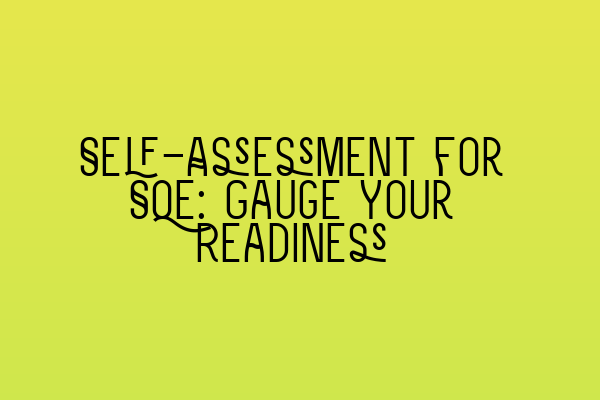Self-Assessment for SQE: Gauge Your Readiness
Preparing for the Solicitors Qualifying Exam (SQE) can be a challenging and rigorous process. Aspiring solicitors need to have a thorough understanding of various legal concepts and a strong command of legal reasoning and problem-solving skills. One effective way to determine your readiness for the SQE is through self-assessment. By objectively evaluating your knowledge and skills, you can identify areas that require further study and practice. In this article, we will discuss the importance of self-assessment for SQE and provide you with some practical tips to gauge your readiness.
The Benefits of Self-Assessment
Self-assessment is an invaluable tool for preparing for any examination, including the SQE. It allows you to identify your strengths and weaknesses, enabling you to allocate your study time effectively. By focusing on areas that need improvement, you can make the most efficient use of your study hours and increase your chances of success in the exam.
Furthermore, self-assessment helps you develop a realistic understanding of your current level of knowledge and skills. It prevents overconfidence or underestimation, both of which can negatively impact your preparation. By knowing your weaknesses, you can better prioritize your study materials and seek additional resources or professional guidance if needed.
How to Self-Assess for SQE
Effective self-assessment involves a systematic and thorough evaluation of your knowledge, skills, and understanding of the SQE content. Here are some practical steps you can take to gauge your readiness:
- Review the SQE Syllabus: Familiarize yourself with the official syllabus provided by the Solicitors Regulation Authority (SRA). It outlines the topics and skills you need to master for the exam. Take note of any areas that you are less confident about.
- Take Practice Tests: Utilize practice tests and sample questions to assess your performance. Try to simulate exam conditions as closely as possible to get an accurate evaluation. Pay attention to the questions you struggle with and analyze the reasons behind your mistakes.
- Identify Knowledge Gaps: Compare your performance in practice tests with the syllabus. Identify any gaps in your knowledge or areas where you consistently score lower. These areas will require additional study and practice.
It is important to approach self-assessment with honesty and objectivity. Avoid being too hard on yourself or overly optimistic. Remember, the goal is not to discourage yourself but to identify areas for improvement.
Utilizing Resources
To further enhance your self-assessment process and improve your overall readiness for the SQE, it is beneficial to use additional resources. Consider supplementing your study materials with workshops, interactive learning experiences, and educational articles. Here are some related articles that can provide valuable insights for aspiring solicitors:
- Tenant Rights in the UK: Understanding Your Legal Protections
- Examining the Intricacies of Land Law in the UK
- Legal Considerations in Residential Leases: Essential Insights for Solicitors
- Workshops on Land Law: Interactive Learning for Aspiring Property Law Professionals
- Lease Laws in the UK: Unraveling the Legal Framework for Tenants
These articles can provide you with essential insights and deepen your understanding of specific legal areas relevant to the SQE. By exploring such resources, you can broaden your knowledge and develop a well-rounded perspective, which will be valuable for both the exam and your future legal career.
Conclusion
Self-assessment is a crucial step in your SQE preparation journey. It helps you identify your strengths and weaknesses, allocate your study time effectively, and develop a realistic understanding of your readiness for the exam. By utilizing various self-assessment techniques and resources, you can enhance your chances of success in the SQE and lay a solid foundation for your career as a solicitor. Good luck!

Leave a Reply